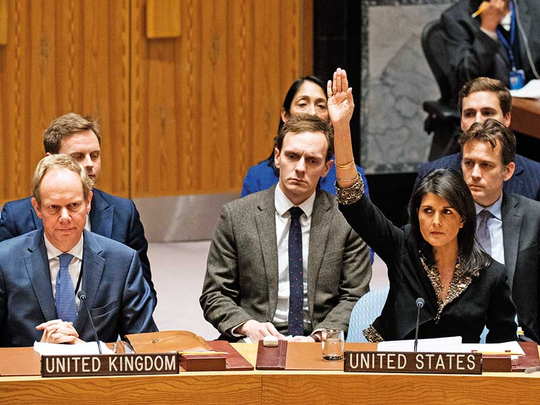
Dubai: Since 1970, the US vetoed 43 resolutions at the UN Security Council that criticised Israel or denounced the measures it takes against the Palestinians. The last incident was on December 18, 2017, when Washington vetoed a draft UN resolution that rejected President Donald Trump’s move to recognise occupied Jerusalem as Israel’s capital.
For decades, the US has defended Israel and protected it with the veto power it has.
In one instance in December 2016, however, the US, under the presidency of Barack Obama, abstained from voting, paving the way for the adoption of UN Security Council Resolution 2334.
The move was hailed by the Arabs and most of the international community.
The resolution stated that Israel’s colonial activities in Occupied Palestinian territorities constituted a “flagrant violation” of international law and have “no legal validity”.
It demanded Israel stop such activity and fulfil its obligations as an occupying power under the Fourth Geneva Convention.
It was the first time the US took such a stand against Israel at the UN Security Council since 1980, under US President Jimmy Carter, when Resolution 465 was unanimously passed.
The resolution criticised Israeli colonial expasion.
However, the Trump administration has a vision that is more in line with that of Israel, Gassan Al Khatib, a political scientist and former member of the Palestinian negotiations team in both Madrid and Washington, told Gulf News.
“Israel never truly believed in the two-state solution,” he added.
Now, under Trump the US is not just defending Israel but going on the offensive by threatening countries that vote against its policies with aid cuts, a move that surprised many members and has backfired on Washington.
Analysts say the US action should come as a wake-up call for the Palestinians and Arabs to look for other options.
“Under (US President Donald) Trump, we will not witness any American positions that allow any resolution that Israel does not approve [to pass],” Al Khatib said.
So far, Trump’s decision on Jerusalem is extremely unpopular. Fourteen out of 15 countries voted against it in the Security Council, and 128 out of 193 in the General Assembly.
Trump has taken advantage of the current collective weakeness of Arab states to make his move, Cairo-based researcher at Al Ahram Strategic Studies Centre Mohammad Izz Al Arab told Gulf News.
In addition, it helps divert public attention away from his many domestic policy blunders while winning support from the powerful American Jewish lobby, he explained.
The US, however, will pay a heavy price for Trump’s reckless decision, Al Arab believes.
Aaron David Miller, a former US envoy to the peace talks, has in the past issued similar warnings about America’s credibility via the peace process.
US policies should not be dictated by Israeli wishes, or be subjected to an “Israeli veto over American negotiations positions,” he wrote in his book “The Much Too Promised Land” which was published in 2008.
“If we don’t show resolve, independence, and toughness, we’ve got no business being in the peacekeeping business,” he said.











